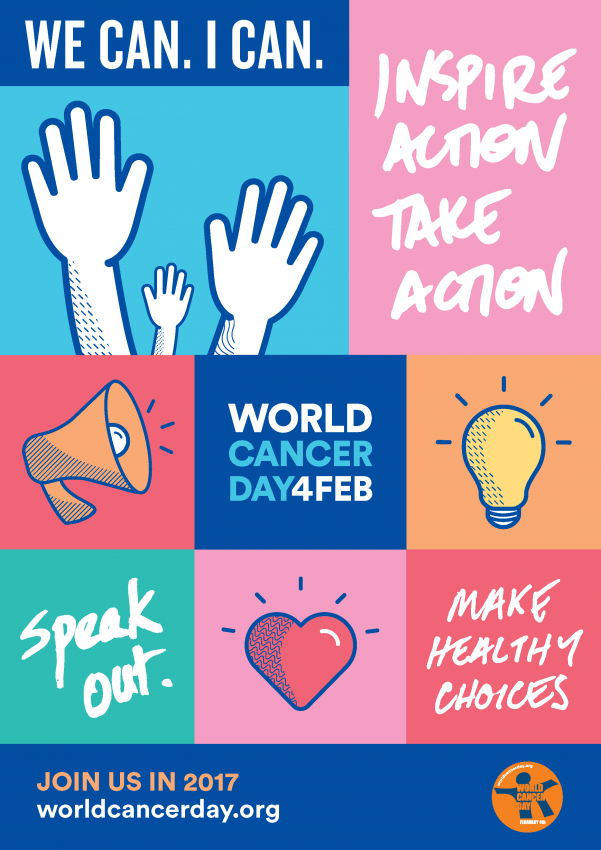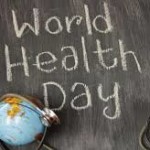Every year, on February 4th, everyone unites to raise more awareness and education about cancer; its various types and daily tips for prevention. The theme for Cancer Day this year is ‘We can. I can’, highlighting how everyone – collectively or as individuals – can do their part to reduce the global burden of cancer.
Here are 6 tips to reduce the risk, for you to keep in mind and to tell everyone around you;
1. Don’t use tobacco

2. Eat a healthy diet
Although making healthy selections at the grocery store and at mealtime can’t guarantee cancer prevention, it might help reduce your risk. Consider these guidelines:
- Eat plenty of fruits and vegetables. Base your diet on fruits, vegetables and other foods from plant sources — such as whole grains and beans.
- Avoid obesity. Eat lighter and leaner by choosing fewer high-calorie foods, including refined sugars and fat from animal sources.
- If you choose to drink alcohol, do so only in moderation.The risk of various types of cancer — including cancer of the breast, colon, lung, kidney and liver — increases with the amount of alcohol you drink and the length of time you’ve been drinking regularly.
- Limit processed meats. A report from the International Agency for Research on Cancer, the cancer agency of the World Health Organization, concluded that eating large amounts of processed meat can slightly increase the risk of certain types of cancer.
3. Maintain a healthy weight and be physically active
Maintaining a healthy weight might lower the risk of various types of cancer, including cancer of the breast, prostate, lung, colon and kidney. Physical activity counts, too. In addition to helping you control your weight, physical activity on its own might lower the risk of breast cancer and colon cancer.
Adults who participate in any amount of physical activity gain some health benefits. But for substantial health benefits, strive to get at least 150 minutes a week of moderate aerobic activity or 75 minutes a week of vigorous aerobic physical activity. You can also do a combination of moderate and vigorous activity. As a general goal, include at least 30 minutes of physical activity in your daily routine — and if you can do more, even better.

4. Protect yourself from the sun
Skin cancer is one of the most common kinds of cancer — and one of the most preventable. Try these tips:
- Avoid midday sun. Stay out of the sun between 10 a.m. and 4 p.m., when the sun’s rays are strongest.
- Stay in the shade. When you’re outdoors, stay in the shade as much as possible. Sunglasses and a broad-brimmed hat help, too.
- Cover exposed areas. Wear tightly woven, loosefitting clothing that covers as much of your skin as possible.
5. Get immunized
Cancer prevention includes protection from certain viral infections. Talk to your doctor about immunization against:
- Hepatitis B: Hepatitis B can increase the risk of developing liver cancer.
- Human papillomavirus (HPV): HPV is a sexually transmitted virus that can lead to cervical and other genital cancers as well as squamous cell cancers of the head and neck. In Nigeria, one woman dies every hour of cervical cancer. Pre exposure vaccine is one of the most effective methods of preventing the transmission of HPV (human papilloma virus). You can vaccinate your children from age 11. Adults can be vaccinated too, but if sexually active before the vaccine, you would still require yearly follow up screenings to be safe.
6. Get regular medical care
Regular self-exams and screenings for various types of cancers — such as cancer of the skin, colon, cervix and breast — can increase your chances of discovering cancer early, when treatment is most likely to be successful. Ask your doctor about the best cancer screening schedule for you.
Take cancer prevention into your own hands, starting today. The rewards will last a lifetime. We Can. I Can.
Culled from Mayo Clinic





